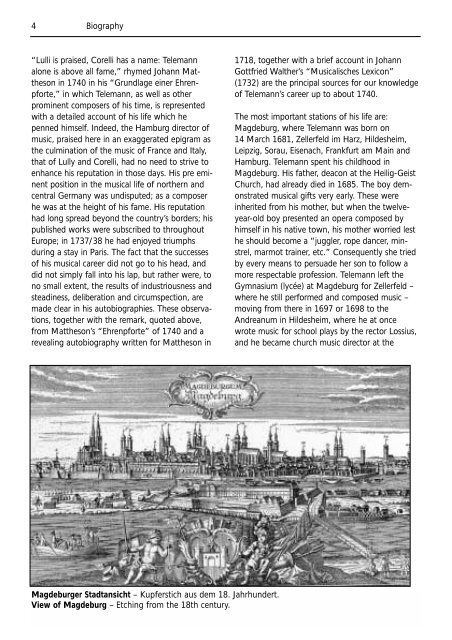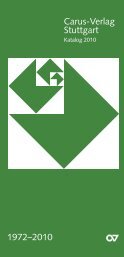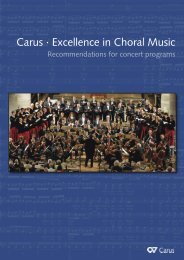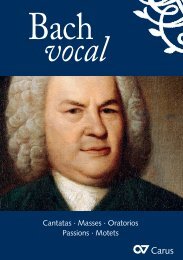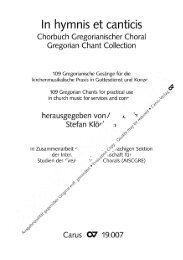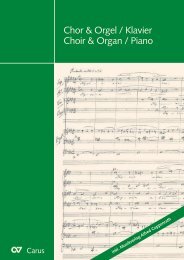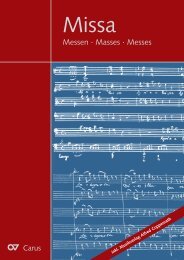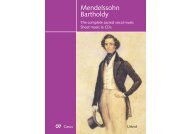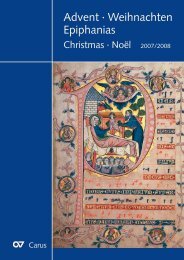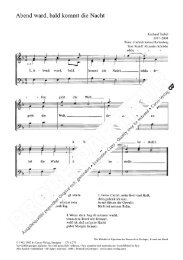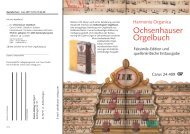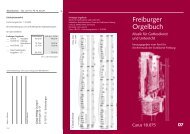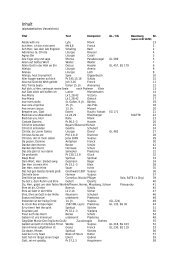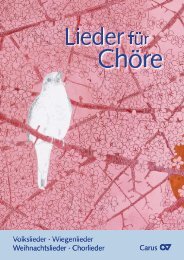Erfolgreiche ePaper selbst erstellen
Machen Sie aus Ihren PDF Publikationen ein blätterbares Flipbook mit unserer einzigartigen Google optimierten e-Paper Software.
4 Biography<br />
“Lulli is praised, Corelli has a name: <strong>Telemann</strong><br />
alone is above all fame,” rhymed Johann Mattheson<br />
in 1740 in his “Grundlage einer Ehrenpforte,”<br />
in which <strong>Telemann</strong>, as well as other<br />
prominent composers of his time, is represented<br />
with a detailed account of his life which he<br />
penned himself. Indeed, the Hamburg director of<br />
music, praised here in an exaggerated epigram as<br />
the culmination of the music of France and Italy,<br />
that of Lully and Corelli, had no need to strive to<br />
enhance his reputation in those days. His pre eminent<br />
position in the musical life of northern and<br />
central Germany was undisputed; as a composer<br />
he was at the height of his fame. His reputation<br />
had long spread beyond the country’s borders; his<br />
published works were subscribed to throughout<br />
Europe; in 1737/38 he had enjoyed triumphs<br />
during a stay in Paris. The fact that the successes<br />
of his musical career did not go to his head, and<br />
did not simply fall into his lap, but rather were, to<br />
no small extent, the results of industriousness and<br />
steadiness, deliberation and circumspection, are<br />
made clear in his autobiographies. These observations,<br />
together with the remark, quoted above,<br />
from Mattheson’s “Ehrenpforte” of 1740 and a<br />
revealing autobiography written for Mattheson in<br />
Magdeburger Stadtansicht – Kupferstich aus dem 18. Jahrhundert.<br />
View of Magdeburg – Etching from the 18th century.<br />
1718, together with a brief account in Johann<br />
Gottfried Walther’s “Musicalisches Lexicon”<br />
(1732) are the principal sources for our knowledge<br />
of <strong>Telemann</strong>’s career up to about 1740.<br />
The most important stations of his life are:<br />
Magdeburg, where <strong>Telemann</strong> was born on<br />
14 March 1681, Zellerfeld im Harz, Hildesheim,<br />
Leipzig, Sorau, Eisenach, Frankfurt am Main and<br />
Hamburg. <strong>Telemann</strong> spent his childhood in<br />
Magdeburg. His father, deacon at the Heilig-Geist<br />
Church, had already died in 1685. The boy demonstrated<br />
musical gifts very early. These were<br />
inherited from his mother, but when the twelveyear-old<br />
boy presented an opera composed by<br />
himself in his native town, his mother worried lest<br />
he should become a “juggler, rope dancer, minstrel,<br />
marmot trainer, etc.” Consequently she tried<br />
by every means to persuade her son to follow a<br />
more respectable profession. <strong>Telemann</strong> left the<br />
Gymnasium (lycée) at Magdeburg for Zellerfeld –<br />
where he still performed and composed music –<br />
moving from there in 1697 or 1698 to the<br />
Andreanum in Hildesheim, where he at once<br />
wrote music for school plays by the rector Lossius,<br />
and he became church music director at the


